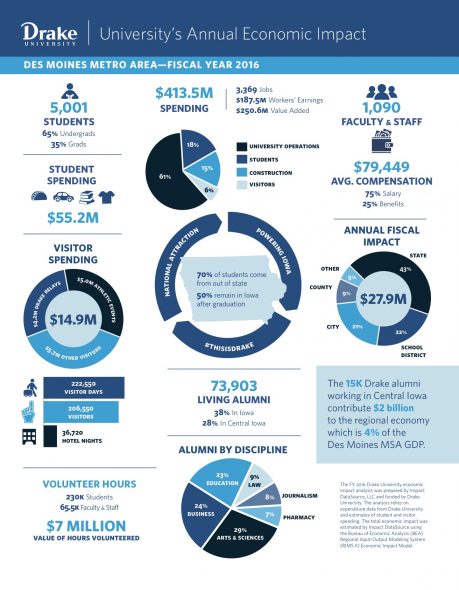Economic Impact Study
Among the report’s key findings:
Drake’s status as a “brain gain” institution—a net importer of students and skilled employees—boosts the regional economy by more than $2 billion.
Nearly 70 percent of Drake students come from outside the state—with only 19 percent coming from the Des Moines metro area—but more than half stay after graduating.
Drake alumni hold 15,259 jobs in the Des Moines area, and those alumni indirectly support another 14,259 jobs. In total, the economic activity associated with Drake alumni contributes approximately $2 billion, or 4 percent, to Des Moines’ GDP.
Drake alumni contribute a total of $183.9 million to state and local tax districts, including $53.1 million to Des Moines Public Schools, $47.9 million to the State of Iowa, $48.6 million to the City of Des Moines, $21 million to Polk County, and $13.3 million to other local tax districts.
Drake supports 3,369 jobs and $187.5 million in workers’ earnings annually through its day-to-day operations, construction projects, and spending by students and visitors.
In 2015–2016 the University paid $86.6 million in compensation and benefits to its 1,080 employees. The University’s day-to-day operations supported another 591 indirect or “spin-off” jobs in Polk County. These tallies did not include student workers, who also earn an income from the University while studying here.
Drake’s investment in major construction projects, including year-round work on two new STEM-related academic buildings slated to open in fall 2017, supported 512 jobs. Student spending supported another 831 jobs in the local economy, while spending by University visitors supported 344.5 jobs.
The University is also a considerable source of tax revenue, bolstering city, county, state, and local jurisdictions with $15.5 million in property taxes, $7.6 million in income taxes, $4.3 million in sales taxes, and $471,485 in hotel taxes in the 2015–2016 fiscal year.
“Drake alumni make a meaningful contribution all over the globe—but nowhere are their achievements more visible than in central Iowa, where they put their skills to work as corporate executives and nonprofit leaders, elected officials and court justices, public school superintendents, entrepreneurs; in short, in every aspect of business and society,” said John Smith, vice president for university advancement. “Des Moines is stronger for the thousands of Bulldogs who choose to call it home.”
The University’s broad range of academic, recruitment, and athletic programming attracts thousands of out-of-town visitors who spend $14.9 million and directly or indirectly contribute to $26.7 million in economic output for the region.
Drake Bulldogs athletics sports fans spend more than $5 million annually on food, retail, lodging, and tickets. The Drake Relays, one of the nation’s preeminent intercollegiate track and field meets, brings an additional $4.2 million in revenue. Visits by prospective students and their families, University board members, and faculty and staff candidates also generate out-of-state revenue for central Iowa.
Drake students, faculty, and staff members give back to the local economy through community service and volunteerism.
Drake contributes 230,000 student volunteer hours and 65,520 faculty and staff volunteer hours, collectively valued at $7 million per year, to local community service and service-learning programs.
The economic impact study comes on the heels of two studies released in 2015 by The Economist and the Brookings Institution which ranked Drake University highly in estimated economic value to students compared to other competitive options for college. Drake’s students earn higher median salaries than would be predicted based on measurable variables, and they exhibit above average performance in occupational earnings potential and federal loan repayment rates. As reviewed in the economic impact study, “Drake University clearly appears to provide an excellent opportunity for students to increase their future potential economic outcomes.”


